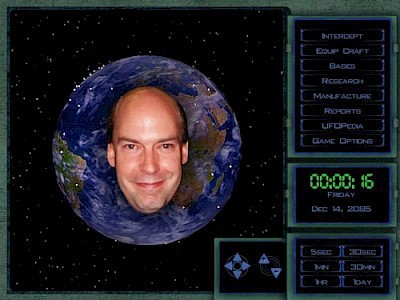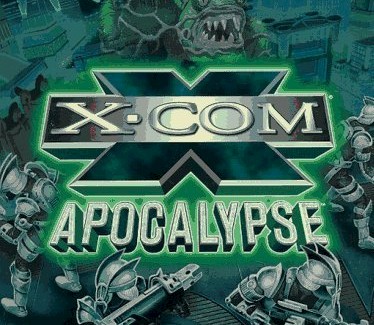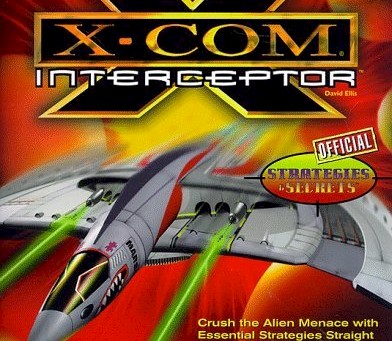Dave Ellis: Early Days

On the 7th of December 1999, Hasbro Interactive cut 2200 jobs, killing many promising projects seemingly at random. One casualty of managements need to improve share prices was X-Com Genesis. Often described as “X-Com on steroids” by fans, it was to be the re-imagining and updating of the original classic game – that even now, years later, fans still clamor for.
In this multi-part interview, we thank Dave for sharing his time with us and taking us through his career in this turbulent industry. We start with the early days, and later parts will focus on X-Com Interceptor and of course, X-Com Genesis…
Part One: EARLY DAYS
During that time period, the author communicates as much as possible with the development team. The amount of cooperation varies from team to team. Many developers are happy to share as much inside info as possible with the strategy guide author. They pass along design documents and notes, artwork, and so on, and answer volumes of questions as they arise. The Gollops were tremendously helpful on the UFO Defense strategy guide, and the team at MicroProse UK was my point of contact on Terror from the Deep.
UFO and TFTD were my first two published guides, and I had a lot longer to write them than is typical now. The goal now is to have the guide on the shelves on or before the day the game ships. The UFO Defense guide didn’t make it to the shelves until about six months after the game shipped. That might have hurt the sales of the book a bit, but it gave me more time to play the game, which is always good.
As for getting sick of the games, it depends on the game. I have never gotten tired of playing UFO or Terror from the Deep.
One day Lary Russel, the documentation manager at the time, came to me and said that Prima wanted to publish a strategy guide for UFO Defense and that he didn’t have time to write it. He asked me to write it, and I did. I guess Prima liked the book because, after that, they started calling me directly. So, back then, I’d work at MicroProse during the day and, when I was writing a strategy guide, work on that well into the night. Because I was working for MicroProse, I was restricted to doing strategy guides for our games. That worked out fine, though, since I worked on most of the games (in some capacity), so I was familiar with them.
To date, I’ve written or co-written 14 strategy guides—10 for Prima and 4 for Sybex. I’m currently under contract to write a 15th guide (for Republic: The Revolution). My most recent guides were for Unreal II: The Awakening, Praetorians, and Starfleet Command III.
Well, that short-term job turned into a career. I was in customer service for about four months and then started working nights in the Quality Assurance department (they needed help testing Darklands). After about two more months, I left customer service to work in QA full-time.
In 1995, I left the QA department to be an assistant designer in the newly formed MicroProse multimedia department, where I helped design the add-on content for Fleet Defender Gold and Pacific Air War Gold. After that, I worked on a lot of projects before I got my shot as lead designer. I pitched the idea of X-COM Interceptor and joined the Chapel Hill, North Carolina studio. I was still working from Hunt Valley, Maryland at the time, though.
When Hasbro bought out the company, I was placed in the role as “X-COM Guru”. I think it came about because I had been with the company for so long and had been connected in some way to all of the X-COM titles (strategy guides, mostly). Plus, both John Possidente and myself were always advocates of the potential of the X-COM series.
The rest is, as they say, history. We started working on Genesis in 1999. Six months after I moved down here (and moved into what was likely the nicest office I’ll ever have for the rest of my professional life), Hasbro gave us the axe.
- CivNet (designed/programmed the interactive tutorials)
- Civilization II (designed/programmed/researched/wrote the Civilopedia)
- Klingon Honor Guard (wrote the story and dialog scripts)
- Civilization II Multiplayer Gold (designed the multiplayer portions and the new Civilopedia)
- X-COM Interceptor (lead designer)
- X-COM Genesis (lead designer)
I also compiled all of the background story for the X-COM universe (as presented in the games) and wrote most of the history that filled in the blanks between the games. (You can read a great deal of the back story that I wrote in the booklet that shipped with Interceptor).
During the development process, I got to visit Paramount Studios and talk with the licensing people from the show. We worked with them throughout, of course. One day, our producer Alex came to my office and told me that our Paramount representative had told him that the person writing our dialog scripts and story really knew how to write for Star Trek. That was one of the best compliments I’ve ever received.
We had the release party for Klingon Honor Guard at Quark’s Bar in the Star Trek Experience at the Las Vegas Hilton. The entire team was flown there and we had the place to ourselves, drinking Romulan Ale and singing Klingon drinking songs. It was great! And, even better than that, four of us took a few extra days and drove to Los Angeles and had a tour of the Voyager and Deep Space Nine sets. I was in heaven!
I got to do lots of things that many don’t have the opportunity to do. The Star Trek thing was tops on my list, but there were other things as well. For instance, while I was working on Fleet Defender Gold, I got to tour the F-14 hangars at Oceana Naval Air Station. I got to touch F-14s and look in the cockpits and all that, plus got a flight school classroom lesson from an F-14 pilot.
Yeah, those were the days…
Several of us in Hunt Valley—namely myself, Mark Reis (from the sound department) and John Possidente—started brainstorming ideas. We thought that flying in the cockpit of an interceptor would be cool. The idea started as a way to use our existing flight sim engines at MicroProse to build a game set during the same time period as UFO Defense. The player would fly the intercept missions in a scripted series of events that coincided with the events in UFO Defense. From there, we would branch out into other interceptor-related titles, culminating in a deep-space combat game (more or less what Interceptor eventually became).
The plan, at least as we saw it, was to develop this game while other teams continued to develop X-COM strategy titles, staggering the releases so that there was always a new X-COM game every six months or so. Obviously, it didn’t quite work that way.
In short, the process in the pre-Hasbro era worked in three stages or “phases” as we called them. Phase 1 was a 3 to 5 page proposal outlining the basic premise of the game. This was prepared by the designer alone and presented (through channels) to the studio head and marketing department.
If everyone liked Phase 1, the designer and an artist or two would prepare Phase 2—a 20 to 30 page design overview complete with concept art, game play details, marketing analysis, and so on.
Finally, if Phase 2 was approved, Phase 3 was prepared. This was a full design document (about 800 pages in our case); complete paper concept art of every object and environment in the game, and a technology demo (a flyable interceptor and a space station in our case). The Interceptor team was the first team that ever went through every stage of the process, and we set the standard for the entire company. That made a lot of the MicroProse veterans rather unhappy, since there were seldom detailed design documents produced for games prior to Interceptor.
So, when the company approved Phase 3, the project was given the green light and the money.
When you’re dealing with an outside publisher, the process is a lot different and there is a lot more dictating as to what the developer can and can’t do concept-wise. Since all of our money at the time was internal, there was a lot more design freedom. That doesn’t happen much today, unless you have a lot of status behind you (like at Firaxis and Big Huge Games for example).
When Hasbro took over, the future looked really bright for X-COM at first. There was talk of toys, cartoons, comic books…the whole works. But only internal talk and, as we all can see, it never got very far.
At the time, Chapel Hill was a small studio that worked mainly on conversions and multiplayer updates. When the Titanic game fell through, Chris Clark (designer of Klingon Honor Guard and the US designer who took over the Alliance project) and I talked to Gilman Louie at Spectrum and convinced him to allow Chapel Hill to work on Klingon Honor Guard and a new X-COM game. I verbally pitched the Interceptor idea to Gilman at that point, and it went from there. Klingon Honor Guard quickly went to Hunt Valley, but Interceptor was developed by Chapel Hill with me as long-distance designer.
When Hasbro took over, I was actively promoting what eventually became Genesis from day one. I made myself a nuisance to our new management, and as a result became even more visible. I started finding myself speaking not only for Genesis, but also for X-COM in general. Our head of studios, Paul Fullwood, eventually decided to christen me the “X-COM Guru”. I compiled the history of the X-COM game universe into an interactive help file that could be distributed to any development teams in the future who were producing X-COM games. In addition, Paul issued a memo that said that all X-COM decisions were to be passed through me before being implemented—box copy, art, etc. Plus, I was already a point of contact to the X-COM fans. I started a dialog on XCommand during Interceptor, and kept talking to the fans right to the end.
This was, I should point out, after Hasbro decided to move Alliance from the UK to Hunt Valley. I was sent to the UK along with several of the other folks from Hunt Valley on that rather uncomfortable trip. We left Maryland thinking that we were going over to evaluate the game’s progress. We were en-route when we got a call from the Hasbro producer who was already in the UK shutting down the project. We were in shock, and we thought it was a bad idea to take the game away from the people who had created it—and we were rather ticked off that we were going in looking like the villains who were stealing it! We lost a lot of excellent game developers in that layoff.
After Interceptor, I put out an open call for ideas online and got a lot of responses to the e-mail address we established for that purpose. The whole team felt it was important to get the fans’ input. There were the requisite rants, but by and large it was a good experience. I’ve made several online friends as a result. One of the regular X-COM fans was even brought in for an interview for an assistant designer position based on his input in the forums.
Our burden of responsibility was to make a great game. We came up a bit short on Interceptor for a number of reasons, but we were right on target with Genesis. I always wanted X-COM to be more than just a game series, and I think it was at one point well on its way. It’s a shame that X-COM has all but disappeared now.
And that’s part one! Part two will go into depth on X-Com Interceptor as well as exploring the start of X-Com Genesis.
Part 1: Dave Ellis: Early Days
Part 2: Dave Ellis: Interceptor
Part 3: Dave Ellis: Genesis


